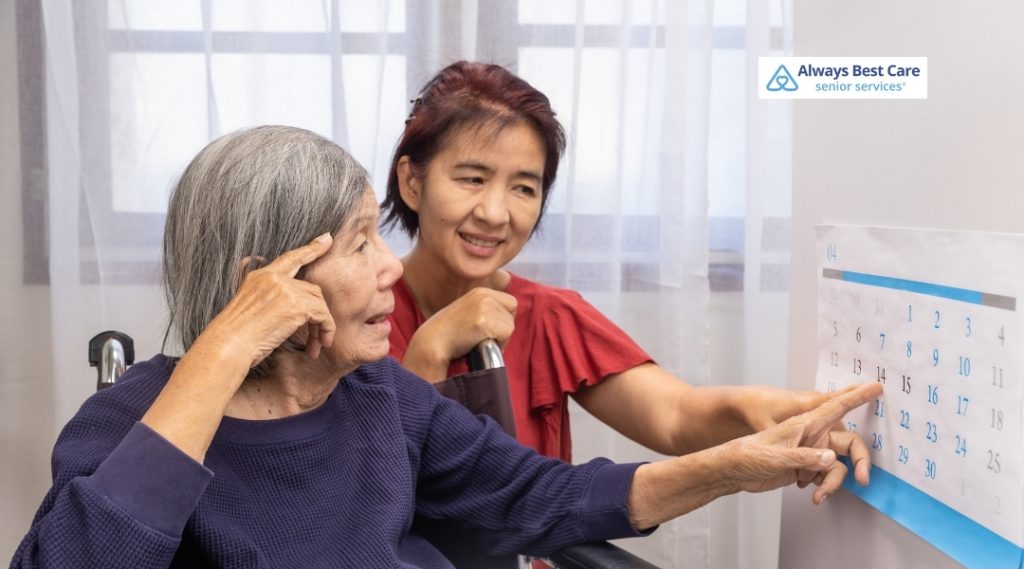Lost and Found: Navigating Dementia and Safeguarding Seniors in West Monroe, LA

Caring for someone with dementia is never a walk in the park, especially when wandering becomes a daily worry.
If you’ve ever found yourself pacing the floors at midnight or jumping every time the doorbell rings, you know just how nerve-wracking it can be when a loved one might wander off.
At Always Best Care of West Monroe, we truly understand that keeping seniors safe means more than just locking doors; it’s about understanding why wandering occurs and how we can respond with compassion and creativity.
What you will learn:
- Why dementia-related wandering happens and how to recognize early warning signs in your loved ones.
- Practical, compassionate strategies for making your home and community safer for seniors living with memory loss.
- How to decide when memory care might be the right next step and what support options are available in West Monroe, LA.
Table of Contents
Why Do People with Dementia Wander?
Wandering isn’t just an absent-minded stroll around the block. For many folks living with Alzheimer’s or other types of dementia, it’s often triggered by:
- Searching for something (or someone) they believe is lost.
- Trying to relive old routines; think heading out to work or picking up grandkids.
- Feeling out of sorts due to overstimulation or anxiety.
- Good ol’ boredom setting in after too much quiet time.
- Not knowing where or even when they are.

Spotting the Warning Signs of Wandering
While not everyone will wander as dementia progresses, there are some tell-tale clues that should make us sit up and take notice:
- Regularly trying doors or windows as if itching to leave.
- Frequently asking if it’s time “to go home,” even while sitting on their own couch!
- Seeming restless in crowds or unfamiliar settings.
- Getting turned around easily, even inside their own house.
- Pacing back-and-forth near exits like they’re waiting for something (or someone).
Keeping Seniors Safe from Wandering
Here are some hands-on ideas we share with families across West Monroe:
1. Secure the Home
- Install door alarms that chime whenever someone heads out unexpectedly.
- Use locks that require two steps, or place them higher than eye level.
- Motion sensors can alert you if there’s movement during odd hours.
- GPS tracking shoes.

2. Stick to a Routine
A predictable day helps calm nerves:
- Meals served on schedule.
- Daily walks (supervised!).
- Activities matched to their interests.
3. Make It Easy to Navigate at Home
Let color-coded tape guide their way through hallways! Label rooms with big letters and use photos rather than words whenever possible.
4. Limit Triggers and Overwhelm
Avoid busy shopping centers during peak hours. Instead, choose quiet parks or simple activities like puzzles and music afternoons right at home.
5. Rally the Neighbors
Let trusted neighbors know about your loved one so extra eyes are always watching out, and keep recent photos handy just in case somebody spots them outside alone.
Is Memory Care the Right Step?
There comes a point where even superheroes need backup, and sometimes bringing care into the home simply isn’t enough anymore.
Memory care communities offer:
- 24/7 supervision by trained staff who specialize in memory loss.
- Locked entryways/exits so wandering turns into walking circles safely indoors.
- Tailored activities designed specifically for those living with cognitive changes.
- Emotional support through small group interactions.
Choosing memory care doesn’t mean giving up independence; it means handing over worries while letting dignity shine through everyday life.

FAQ about Dementia Wandering & Senior Safety
Q: What should I do first if my loved one wanders away?
A: Call local authorities immediately—time is crucial! Have recent photos ready, along with medical details, handy for responders.
Q: Isn’t locking doors dangerous during emergencies?
A: That’s why specialized locks allow quick exit from inside but prevent easy access from outside, and alarms give us peace of mind without sacrificing safety.
Q: How does Always Best Care help reduce wandering risks?
A: We personalize plans based on each person’s needs, from supervised outings to meal schedules, all tailored to what feels safest for everyone involved.
Q: Can routine really make such a difference?
A: Absolutely! Familiar rhythms anchor those living with memory loss; they feel less urge (and less confusion) about leaving suddenly when daily life makes sense.
Peace of Mind Starts with Partnership
When caring feels overwhelming (or when worry keeps you awake), we want you to remember: nobody faces this challenge alone here in West Monroe.
Always Best Care partners shoulder-to-shoulder with families through thick and thin, from sharing prevention tips all the way through transitions into loving memory care environments if needed.
Contact Always Best Care of West Monroe at (318) 322-2223 to learn more and schedule your free consultation.





